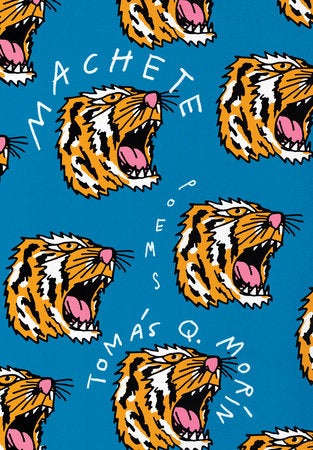Tomás Morín’s newest book of poetry, “Machete,” has roared onto the scene with the same intensity as the tigers on its striking cobalt blue cover.

Morín, an assistant professor of creative writing at Rice, has been on a book tour supporting his third collection of poetry. “Machete” is drawing raves from the likes of Publishers Weekly — “playful and piercing, this impressive collection demonstrates a radical kind of empathy,” the reviewer wrote — and the Texas Observer, which called the book “meticulously researched and wonderfully intimate.”
Morín will read from “Machete” during the latest stop on his tour, in person at Rice in the Ray Courtyard outside the Rice Memorial Chapel on Nov. 16 at 5:30 p.m. The book reading is presented by the Department of English, Fondren Library and the Cherry Reading Series.
Morín will be joined at the Nov. 16 reading by special guests and fellow poets Dave Lucas and Michael Croley. Lucas was the second Poet Laureate of Ohio; Croley teaches at Denison University and is on the visiting faculty at the Vermont College of Fine Arts, where Morín also teaches in the low-residency MFA in Writing program.
“Machete” is “far and away the most intimate” of Morín’s three books of poetry, which he attributes to becoming a father.
“That totally altered the ways in which I think about my relationship to racism, my relationship to being a man, the sort of horrid ways in which capitalism tries to chew us all up and take our humanity away,” said Morín, who grew up in a small rural town in South Texas. “I wanted to write about all these things in a way that wasn't just from anger.”
The result, as seen in such tender odes to fatherhood as “Two Dolphins” and “Vallejo,” is poetry that alludes to Morín’s thought process as he works through these things on paper: compassionate, questioning, funny, humane and ultimately joyful, down to the last poem in the book, which Morín said touches on the empowering nature of humor and the way it can clear a path just like a machete.
“Anger and outrage is an appropriate response to the things that this country throws at us, but it's also not the only response,” Morín said. “I feel like as a person of color, some people would prefer to see me go away — to be invisible, to not be here anymore — and one of the things that threatens them the most is my joy.”

“Machete” is Morín’s third collection of poetry, following “A Larger Country” and “Patient Zero.” In his work as a translator, Morín translated Pablo Neruda’s visionary “The Heights of Macchu Picchu.” This spring, Morín will once again teach a course on the art of translation; this fall, he’s currently teaching Introduction to Poetry and Narrative Medicine.
“It’s been so incredible to have conversations with students and deep discussions about how we as people tell stories about our bodies when we are unwell,” Morín said of the latter course. “When you go into an examination room and the doctor says, ‘So what brings you in today?’ that's an invitation to tell a story that is actually collaborative.”
Morín will be reading from “Machete” alongside Lucas and Croley, who will also spend time on Tuesday with a group of creative writing students. Introducing his fellow poets to the Rice community and vice versa is joyful for Morín too.
“I'm just so thrilled that I get to bring my friends and share that with them,” Morín said. “The whole thing should be a blast.”

